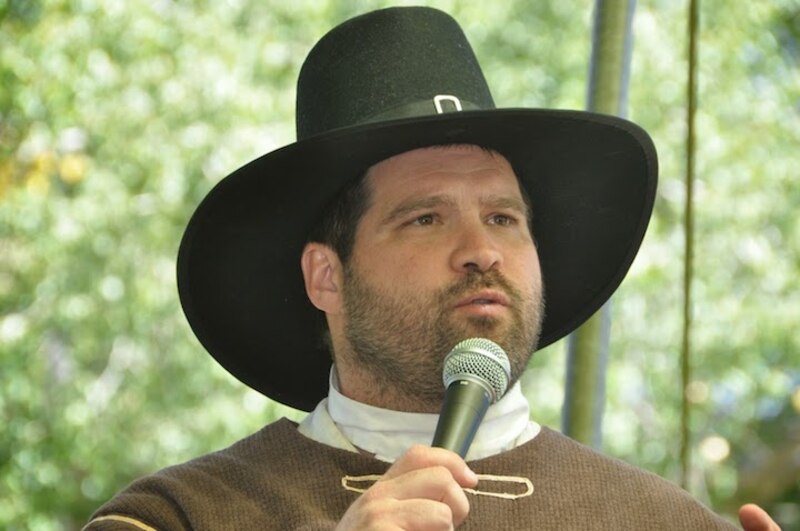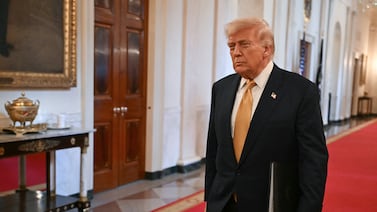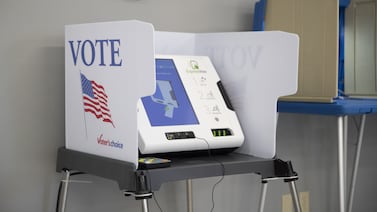A version of this post was originally distributed in Votebeat’s weekly newsletter. Sign up here.
We live in a hellscape of misinformation, and sometimes (well, in elections, a lot of the time) that misinformation makes it into print. It is rare to see a newspaper retract an entire column, and rarer still when the writer of the column is a 45-year veteran of the paper. But that’s what happened this week in Connecticut, after the Journal-Inquirer — a daily paper in northern Connecticut — retracted an op-ed piece.
“There was misinformation in Chris Powell’s column that appeared on Aug. 4,” the paper wrote, before offering four bullet points of corrections to false claims the former managing editor and current columnist had made. Among them, that Connecticut Secretary of State Denise Merrill had denied any voter fraud had ever taken place (she has not), incorrect information on voter roll maintenance, a claim that the secretary of state’s office had subpoena power, and false claims that public voter rolls are the only way to detect fraud.
The paper not only issued the correction, but also allowed Merrill to write a response, published on Friday. “There has been much talk about election integrity recently — in this newspaper, across the state, and nationally,” she began. “Unfortunately, much of that discussion has veered into misinformation.”
To be sure, 16 days between the initial error and a full-throated response is not ideal — this article (opinion or not) could easily have been fact checked, and it’s stunning that such inaccuracies were written by a man with such lengthy journalistic experience in Connecticut. The correction came after the secretary’s office issued point-for-point rebuttals and emailed the paper asking it to retract the article.
After I helped ProPublica run its Electionland project for the first time in 2016, it dawned on me that the media does not just report on election administration — we play a part in election administration’s service to the public. As I watched hundreds of students from across the country scoop up tips from social media and data from watchdog groups for Electionland coverage, I realized that so much of what voters misunderstood about elections was a result of the media’s lack of understanding and failure to engage with election officials. Voters were confused about requirements, and their misunderstandings were ones I recognized from popular headlines.
Since that year, I’ve done dozens of trainings for reporters on voting rights and election administration. In each, I’ve tried to stress that journalists are not just covering election administration, we are vital to the health of the entire system. Few voters look to the secretary of state’s website for explanations on how to follow new voting rules; more often they hear them on the radio, see them on the local news, and read about them online. Because of that, we have the power to — and often inadvertently do — mislead voters, increase undeserved doubt, and spread misinformation.
After the 2016 election, I took stock of the complaint data Electionland received from Texas voters. I realized, for example, that because of the media’s portrayal of the ongoing battle over the voter ID law, including incorrect headlines like “Appeals court strikes down Texas voter ID law” (it didn’t), voters were left confused as to how to comply with it. Screaming matches broke out at voter check-in stations — voters told Electionland that since the voter ID law had been overturned, the poll worker asking them for ID must be violating their rights. They were not. To be sure, the state bears responsibility for a failed voter education campaign that reached few voters and was subject to no transparency. But journalists deserve an equal measure of blame for poorly understanding election processes and the court decisions that changed them.
If the Connecticut example from this week proves anything, it is that when both the media and the state are transparent about their failures and work together in a productive way, they can supply voters with good information. But it takes two to tango. The media needs to engage more deeply with processes and procedures, and local and state election officials need to be more open in their willingness to engage with the press — both in inviting frank discussions and in giving frank feedback on the quality of coverage in a professional way. Votebeat hopes to be a vehicle for that, but it will take more than one brand new news organization to pull off 2022.
Back Then
There’s been a lot of talk bandied about in recent weeks describing voting as “American as apple pie,” or even “a constitutional right.” The first is an exaggeration, the second is false. I talked about this in more detail with Amanda Litman recently on the Battleground podcast. During our chat, though, I talked less about the long history of newspapers as the frontlines of voting debates, a role that Votebeat is eager to play. Unlike the makeup of the electorate, journalism was enshrined in the Constitution. Why? Because the founders wanted us to help voters — and society in general (not that many people voted then, you know) — understand the workings of society so they could participate in it. So it is appropriate, then, that much of the public debate over the makeup of the electorate has taken place in the media. “The ultimate end of all freedom is the enjoyment of the right to free suffrage,” read one piece in the Maryland Gazette in 1776. In the 1800s, debates over exactly who should have that right took place in widely read journals such as Atlantic Monthly and The Nation and in the later part of the century, the Washington Post. They continue to this day. The media has always had influence over voting, and we should wield it wisely.
In Other Voting News
- A quorum has been restored in Texas, as three additional House members (Democrat Reps. Garnet Coleman, Armando Walle, and Ana Hernandez) have returned from advocating for voting rights in D.C. Quorum was achieved by a margin of one, with one Republican representative who had been diagnosed with COVID attending, though he was kept in an isolation room within the chamber. This week, Texas Gov. Greg Abbott was also diagnosed with COVID and it continues to spread across the state, meaning that maintaining a quorum may soon be out of either party’s control. A hearing for the bill is scheduled for today.
- The fallout from a Colorado county clerk’s alleged involvement in the leaking of sensitive election hardware and logins continues. Mesa County Clerk Tina Peters has been suspended pending investigations by both the state and the FBI. The former secretary of state for Colorado, Wayne Williams, and a former clerk in Mesa County, Sheila Reinert, will now share duties during the state’s upcoming elections. This is a nightmare scenario for election security experts, who have been training states to prevent outside threats for years but who have little power to control the threats from inside the house.
- The courts keep dealing swift blows to the Republicans in Arizona. For the second time this week, a judge has ruled Senate Republicans must turn over documentation from their contract with Cyber Ninjas, the lead contractor on the state’s goat rodeo audit. Cyber Ninjas are set to release their report Monday, and election officials and experts have already begun an offensive campaign against it.
- Pennsylvania state Sen. Doug Mastriano has said his efforts to do a “forensic audit” of the 2020 election have been “stopped” — but only temporarily — by the “powers that be” in the Republican Party. He did not elaborate. The Republican Party has been tight-lipped about its support for Mastriano’s plan, though a few have spoken out publicly against it.
- Annapolis, Maryland, will be allowed to mail ballots for the city’s primary election next month, the state’s appeals court has ruled. The ruling tossed a challenge to the county’s new voting system filed by two Republican candidates who alleged it failed to meet city codes.
- A New York poll worker is healthy after he collapsed during the June primaries and received life-saving aid from a co-worker. As the Staten Island Advance writes, “Fortunately, Elections Surveyor Michael Arvanites had stopped by the location in his role as — of all things — a troubleshooter.” Arvanites performed CPR until paramedics arrived, and Robert Ramsey, 78, is back to spending time with his three grandchildren.
In Their Downtime

This week’s hobbyist is Ricky Hatch, county clerk in Weber County, Utah, who portrays William Bradford, the second and longest-serving governor of Plymouth Colony! In costume, he gives memorized speeches about the importance of liberty and the emergence of a new country.
When he was young, he learned from his parents that he was a descendant of Bradford, but he was too young to understand the significance. “The church we belong to puts a lot of emphasis on knowing your family history, so I kind of felt guilty that I never knew much about an apparently famous ancestor of mine,” he said. Then, in 2013, he found himself serving on the Constitution Day Committee of Utah.
“The committee chair, who knew nothing about my ancestry, said, ‘Ricky, would you be willing to portray William Bradford? For some reason, when I think of him, you come to mind,’” he said. “I continue doing it not just because of that personal connection, but because the Pilgrims have so much to teach us. Like everyone, they certainly weren’t perfect, and they’re catching a lot of heat right now from people who don’t fully understand why they came and how they lived, so anything I can do to help correct that narrative is meaningful.”
Ricky’s favorite experience was in front of an audience of about 300 in a high school auditorium. As he was giving his memorized 15-minute speech, he says it hit home for him “how much [Bradford] and his family sacrificed to obtain religious freedom.” Bradford’s wife had fallen off the Mayflower, only a few hundred feet from shore, and would never step foot in America.
“As I thought of this, I realized that Bradford would probably be pleading with us to preserve the liberty that he and many others so faithfully helped establish,” he said. “It was quite an emotional moment, where I went from portraying someone to feeling how passionately they wanted liberty.”
He has since begun to study the writings of his ancestor, and says he takes comfort and pride in Bradford’s history. That the voyagers on the Mayflower established a compact and elected a leader before the country was even founded makes him “value the election process even more,” he said. “Elections bring legitimacy and order to communities and nations. It’s quite sobering to be a small part of that.”






